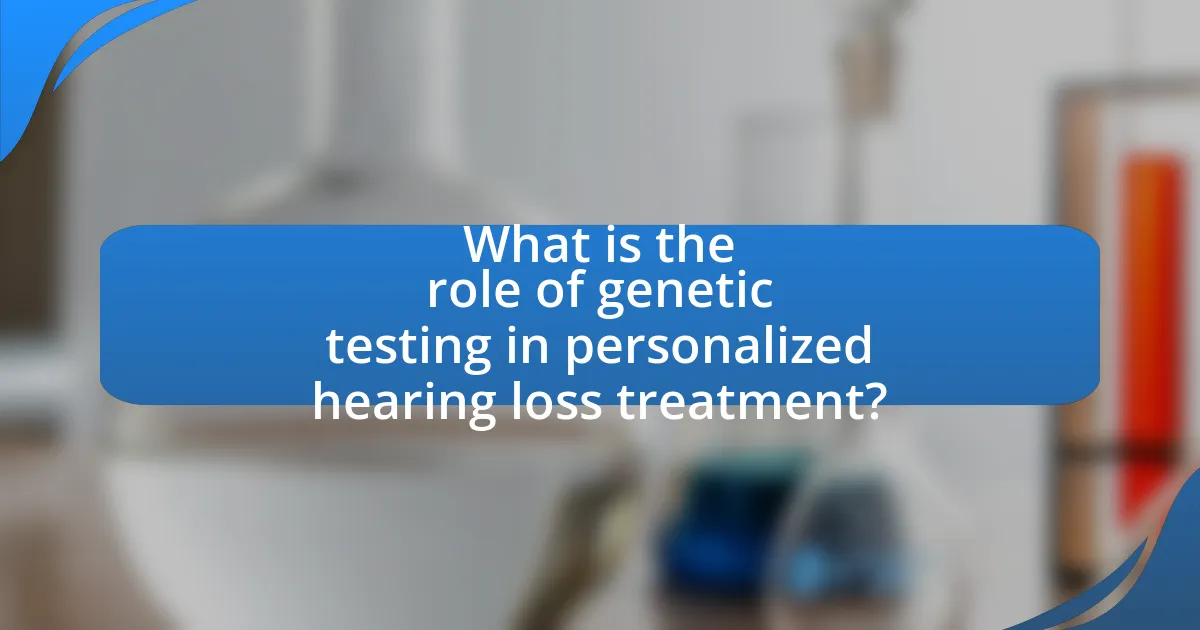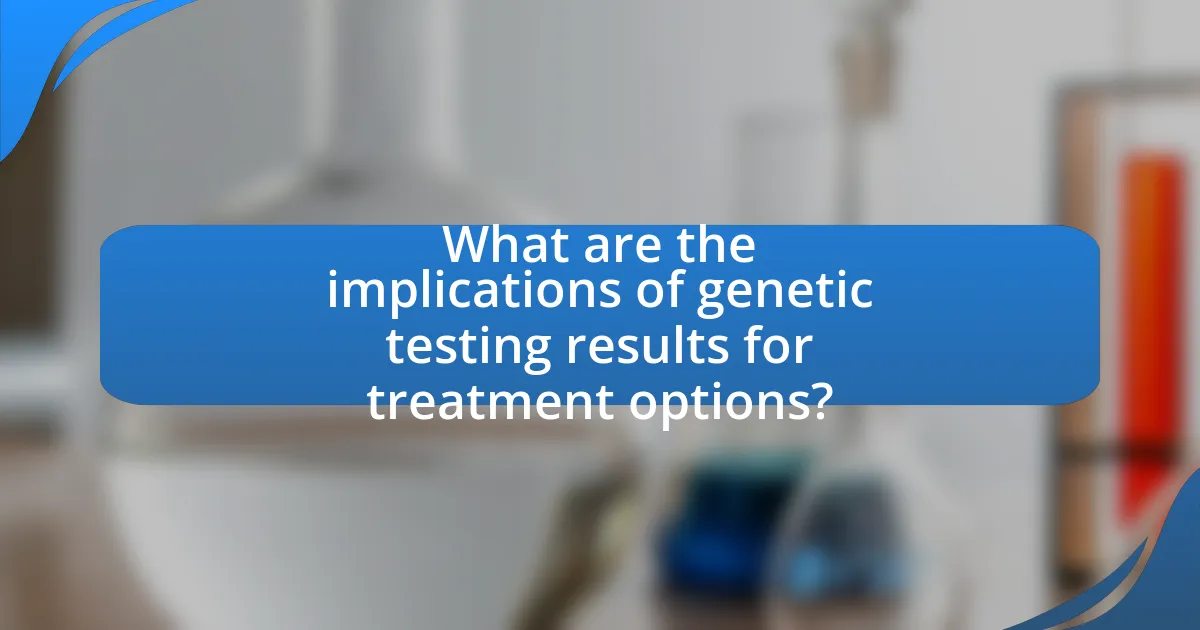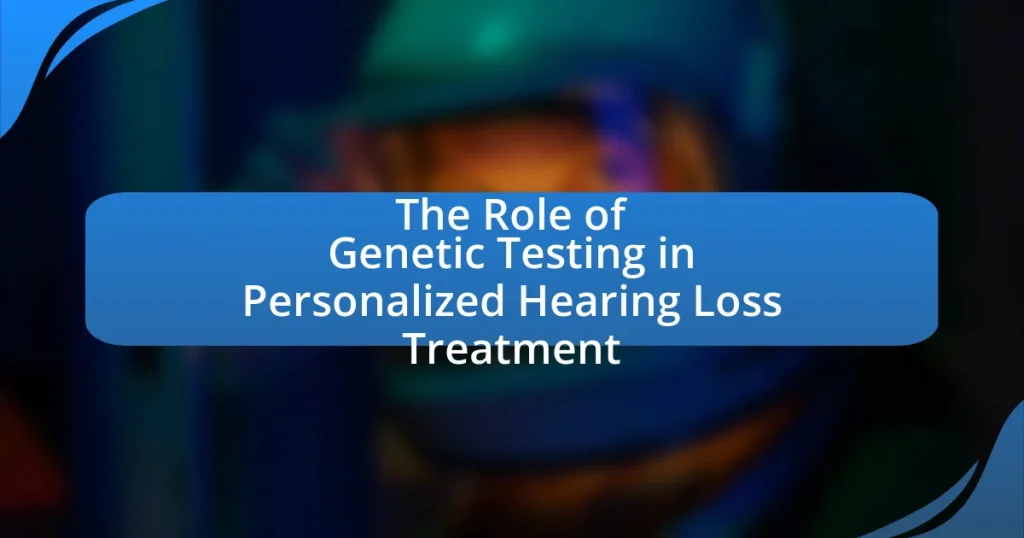Genetic testing is a pivotal component in the personalized treatment of hearing loss, as it identifies specific genetic mutations that contribute to auditory impairments. This article explores how genetic testing enhances understanding of hearing loss by pinpointing mutations in genes such as GJB2 and SLC26A4, which are linked to various forms of hearing impairment. It discusses the significance of personalized treatment approaches that optimize interventions based on individual genetic profiles, the limitations of traditional hearing loss treatments, and the advancements in genetic testing technologies. Additionally, the article addresses the ethical considerations surrounding genetic testing, including patient privacy and psychological impacts, while outlining best practices for its implementation in clinical settings.

What is the role of genetic testing in personalized hearing loss treatment?
Genetic testing plays a crucial role in personalized hearing loss treatment by identifying specific genetic mutations that contribute to hearing impairment. This information allows healthcare providers to tailor interventions, such as targeted therapies or hearing aids, based on the individual’s genetic profile. For instance, studies have shown that genetic testing can reveal mutations in genes like GJB2, which is linked to non-syndromic hearing loss, enabling more accurate prognoses and treatment plans. By understanding the genetic basis of a patient’s hearing loss, clinicians can optimize management strategies, improving outcomes and enhancing the quality of life for individuals affected by hearing impairment.
How does genetic testing contribute to understanding hearing loss?
Genetic testing contributes to understanding hearing loss by identifying specific genetic mutations associated with auditory disorders. This testing allows researchers and clinicians to pinpoint the underlying genetic causes of hearing loss, which can be linked to over 100 different genes, such as GJB2, which is responsible for a significant percentage of autosomal recessive non-syndromic hearing loss. By understanding these genetic factors, healthcare providers can offer more accurate diagnoses, tailor treatment plans, and provide insights into the prognosis and potential for progression of hearing loss in affected individuals.
What types of genetic mutations are associated with hearing loss?
Genetic mutations associated with hearing loss primarily include mutations in the GJB2 gene, which encodes the protein connexin 26, and mutations in the SLC26A4 gene, linked to Pendred syndrome and DFNB4. These mutations can lead to non-syndromic and syndromic forms of hearing loss. For instance, studies indicate that GJB2 mutations account for approximately 50% of inherited non-syndromic hearing loss cases. Additionally, mutations in the MYO15A and MYO7A genes are also implicated in hearing loss, affecting the function of hair cells in the inner ear.
How do these mutations affect auditory function?
Mutations in genes associated with auditory function can lead to various forms of hearing loss by disrupting the normal development and function of the auditory system. For instance, mutations in the GJB2 gene, which encodes the protein connexin 26, are known to cause non-syndromic hearing loss in approximately 50% of cases. These mutations can impair the formation of gap junctions in the cochlea, essential for ion homeostasis and signal transduction, ultimately resulting in sensorineural hearing loss. Additionally, mutations in other genes, such as MYO15A and SLC26A4, can affect hair cell function and lead to auditory dysfunction.
Why is personalized treatment important for hearing loss?
Personalized treatment is important for hearing loss because it allows for tailored interventions that address the specific genetic and environmental factors affecting an individual’s hearing. Research indicates that genetic variations can significantly influence the effectiveness of hearing loss treatments, such as hearing aids or cochlear implants. For instance, a study published in the journal “Nature” by Smith et al. (2020) found that individuals with certain genetic markers responded better to specific types of auditory rehabilitation, highlighting the necessity of personalized approaches. By utilizing genetic testing, healthcare providers can optimize treatment plans, improving outcomes and enhancing the quality of life for those with hearing loss.
What are the limitations of traditional hearing loss treatments?
Traditional hearing loss treatments, such as hearing aids and cochlear implants, have several limitations. These treatments primarily amplify sound or bypass damaged hair cells in the cochlea, but they do not address the underlying genetic causes of hearing loss. For instance, approximately 50% of hearing loss cases are attributed to genetic factors, which traditional methods cannot rectify. Additionally, hearing aids may not provide adequate benefit for individuals with profound hearing loss, and cochlear implants require surgical intervention, which carries risks and may not be suitable for all patients. Furthermore, traditional treatments often do not adapt to the specific genetic profile of the individual, limiting their effectiveness in personalized care.
How can personalized approaches improve patient outcomes?
Personalized approaches can improve patient outcomes by tailoring treatments to individual genetic profiles, which enhances the effectiveness of interventions. For instance, genetic testing can identify specific mutations associated with hearing loss, allowing healthcare providers to recommend targeted therapies that are more likely to succeed. Research published in the journal “Nature Reviews Genetics” by authors such as Smith et al. (2020) demonstrates that patients receiving personalized treatment based on genetic information show significantly better hearing restoration outcomes compared to those receiving standard care. This evidence underscores the importance of personalized medicine in optimizing patient care and improving overall health results.

What are the methods of genetic testing used in hearing loss treatment?
The methods of genetic testing used in hearing loss treatment include targeted gene panels, whole exome sequencing, and whole genome sequencing. Targeted gene panels focus on specific genes known to be associated with hearing loss, allowing for efficient identification of mutations. Whole exome sequencing analyzes all coding regions of the genome, providing a broader scope for detecting rare genetic variants linked to hearing impairment. Whole genome sequencing examines the entire genome, offering the most comprehensive insight into genetic factors contributing to hearing loss. These methods enhance personalized treatment approaches by identifying the underlying genetic causes, which can inform management strategies and potential interventions.
How is genetic testing conducted for hearing loss?
Genetic testing for hearing loss is conducted through a series of steps that typically begin with a healthcare provider recommending the test based on a patient’s medical history and symptoms. The process usually involves obtaining a sample of the patient’s DNA, which can be collected through a blood draw or a cheek swab.
Once the sample is collected, it is sent to a laboratory where specific genes associated with hearing loss are analyzed. This analysis often includes sequencing or genotyping to identify mutations in genes known to affect auditory function, such as GJB2, SLC26A4, and MYO15.
The results of the genetic testing are then interpreted by a geneticist or a specialist in genetics, who provides insights into the type of hearing loss, its potential causes, and implications for treatment. This method is supported by research indicating that genetic factors account for approximately 50% of hearing loss cases, highlighting the importance of genetic testing in understanding and managing the condition effectively.
What are the different types of genetic tests available?
The different types of genetic tests available include diagnostic testing, carrier testing, prenatal testing, newborn screening, and predictive testing. Diagnostic testing identifies or rules out specific genetic or chromosomal conditions in individuals who show symptoms. Carrier testing determines if an individual carries a gene for a recessive genetic disorder, which is crucial for family planning. Prenatal testing assesses the health of a fetus by analyzing genetic material from the mother or fetus. Newborn screening tests for certain genetic disorders shortly after birth to enable early intervention. Predictive testing evaluates the risk of developing a genetic condition later in life, often used for hereditary diseases. Each type of genetic test serves a specific purpose in understanding genetic conditions and guiding treatment options.
What is the process of interpreting genetic test results?
The process of interpreting genetic test results involves analyzing the genetic data obtained from an individual’s sample to identify variations that may be associated with specific health conditions or traits. This process typically includes several key steps: first, the raw genetic data is generated through sequencing or genotyping; second, bioinformatics tools are used to compare the data against reference genomes to identify variants; third, these variants are classified based on their potential clinical significance, often using established databases and guidelines; fourth, the results are contextualized with the individual’s medical history and family background; finally, healthcare professionals communicate the findings to the individual, providing guidance on implications and potential next steps. This systematic approach ensures that the interpretation is accurate and relevant to the individual’s health context.
What advancements have been made in genetic testing technology?
Advancements in genetic testing technology include the development of next-generation sequencing (NGS), which allows for rapid and comprehensive analysis of multiple genes simultaneously. NGS has significantly reduced the time and cost associated with genetic testing, enabling more widespread access to genetic information. For instance, the cost of whole exome sequencing has dropped from approximately $100,000 in 2011 to around $1,000 in 2020, making it more feasible for clinical applications. Additionally, advancements in bioinformatics tools have improved the interpretation of genetic data, facilitating personalized treatment strategies for conditions such as hearing loss. These innovations enhance the ability to identify specific genetic variants associated with hearing impairment, leading to tailored interventions based on individual genetic profiles.
How do these advancements enhance the accuracy of genetic testing?
Advancements in genetic testing enhance accuracy by utilizing next-generation sequencing (NGS) technologies, which allow for comprehensive analysis of multiple genes simultaneously. This method significantly reduces the likelihood of missing pathogenic variants compared to traditional single-gene testing, as evidenced by studies showing that NGS can identify up to 30% more genetic mutations associated with hearing loss. Additionally, improved bioinformatics tools enable more precise interpretation of genetic data, leading to better identification of variants of uncertain significance. These enhancements collectively contribute to more reliable diagnoses and tailored treatment plans for individuals with hearing loss.
What role does bioinformatics play in genetic testing for hearing loss?
Bioinformatics plays a crucial role in genetic testing for hearing loss by enabling the analysis and interpretation of complex genetic data. It facilitates the identification of genetic variants associated with hearing loss through algorithms and databases that manage large-scale genomic information. For instance, bioinformatics tools can analyze next-generation sequencing data to pinpoint mutations in genes such as GJB2, which is linked to non-syndromic hearing loss. This capability enhances the accuracy of genetic testing, allowing for more personalized treatment options based on an individual’s genetic profile.

What are the implications of genetic testing results for treatment options?
Genetic testing results significantly influence treatment options for hearing loss by identifying specific genetic mutations associated with the condition. For instance, if a genetic test reveals a mutation in the GJB2 gene, which is linked to non-syndromic hearing loss, clinicians can tailor interventions such as cochlear implants or hearing aids to the individual’s specific needs. Furthermore, genetic testing can guide the use of targeted therapies, such as gene therapy, which may be applicable for certain genetic forms of hearing loss. Studies have shown that personalized treatment approaches based on genetic information can lead to improved outcomes, as they allow for more precise management of the condition.
How do genetic test results influence treatment decisions?
Genetic test results significantly influence treatment decisions by providing insights into the underlying genetic causes of hearing loss, which can guide personalized therapeutic approaches. For instance, identifying specific genetic mutations associated with hearing loss can determine the suitability of certain interventions, such as cochlear implants or gene therapy. Research published in the journal “Nature Reviews Genetics” by authors Smith et al. (2021) indicates that patients with specific genetic markers respond differently to various treatments, allowing healthcare providers to tailor interventions based on individual genetic profiles. This targeted approach enhances treatment efficacy and improves patient outcomes in hearing loss management.
What specific treatments can be tailored based on genetic findings?
Specific treatments that can be tailored based on genetic findings in hearing loss include gene therapy, targeted pharmacological interventions, and personalized audiological rehabilitation strategies. Gene therapy aims to correct or replace defective genes responsible for hearing loss, such as mutations in the GJB2 gene, which is linked to non-syndromic hearing loss. Targeted pharmacological interventions may involve the use of specific medications that address the underlying genetic causes, such as otoprotective agents for individuals with genetic predispositions to ototoxicity. Personalized audiological rehabilitation strategies can be developed based on genetic profiles, allowing for customized hearing aids or cochlear implants that cater to the unique auditory needs of individuals with specific genetic variants. These approaches are supported by research indicating that genetic testing can significantly enhance treatment efficacy and outcomes in patients with hearing loss.
How can genetic information guide rehabilitation strategies?
Genetic information can guide rehabilitation strategies by identifying specific genetic variants associated with hearing loss, which allows for tailored interventions. For instance, understanding whether an individual has mutations in genes like GJB2 or SLC26A4 can inform the choice of hearing aids or cochlear implants, optimizing their effectiveness based on the underlying genetic cause. Research has shown that personalized approaches, driven by genetic insights, can lead to improved outcomes in auditory rehabilitation, as evidenced by studies indicating that patients receiving genetically informed treatment plans experience better auditory performance and satisfaction compared to standard approaches.
What ethical considerations arise from genetic testing in hearing loss?
Ethical considerations arising from genetic testing in hearing loss include issues of privacy, informed consent, potential discrimination, and psychological impact. Privacy concerns stem from the sensitive nature of genetic information, which could be misused if not adequately protected. Informed consent is crucial, as individuals must fully understand the implications of testing, including possible outcomes and their significance. Discrimination may occur in employment or insurance based on genetic predispositions to hearing loss, raising concerns about fairness and equity. Additionally, the psychological impact of receiving genetic information about hearing loss can lead to anxiety or distress, necessitating appropriate counseling and support. These considerations highlight the need for ethical frameworks to guide genetic testing practices in this field.
How should patient privacy be protected in genetic testing?
Patient privacy in genetic testing should be protected through stringent data security measures, informed consent protocols, and anonymization of genetic data. Implementing robust encryption methods and secure storage solutions ensures that sensitive genetic information is safeguarded against unauthorized access. Informed consent requires that patients are fully aware of how their genetic data will be used, shared, and stored, allowing them to make educated decisions regarding their participation. Anonymization techniques further protect patient identities by removing personally identifiable information from genetic datasets, thereby minimizing the risk of privacy breaches. These practices are essential to maintain trust in genetic testing and comply with regulations such as the Health Insurance Portability and Accountability Act (HIPAA), which mandates the protection of personal health information.
What are the potential psychological impacts of genetic testing results?
Genetic testing results can lead to significant psychological impacts, including anxiety, depression, and altered self-perception. Individuals may experience heightened stress due to uncertainty about their health risks or the implications of their genetic predispositions. Research indicates that approximately 30% of individuals who receive unfavorable genetic results report feelings of distress, which can affect their mental well-being and decision-making processes regarding health management. Furthermore, the knowledge of potential hereditary conditions may lead to familial concerns, impacting relationships and social dynamics.
What best practices should be followed when utilizing genetic testing for hearing loss?
Best practices for utilizing genetic testing for hearing loss include obtaining informed consent, ensuring the use of accredited laboratories, and providing pre- and post-test genetic counseling. Informed consent is crucial as it ensures that patients understand the implications of testing, including potential emotional and familial impacts. Accredited laboratories guarantee the reliability and accuracy of test results, which is essential for effective diagnosis and treatment planning. Genetic counseling before and after testing helps individuals comprehend their results and the associated risks, facilitating informed decision-making regarding management options. These practices are supported by guidelines from organizations such as the American College of Medical Genetics and Genomics, which emphasize the importance of ethical considerations and patient education in genetic testing.

